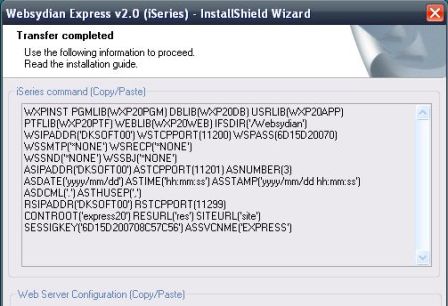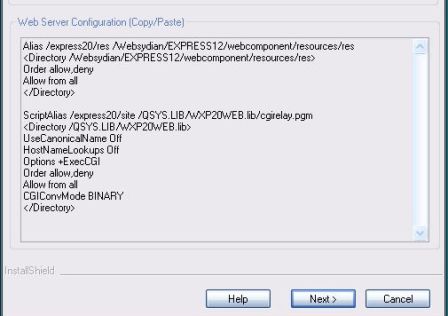
Quick installation guide for Websydian Express for System i
This guide provides everything you need to do in order to install Websydian Express for System i, quickly.
Important! Make sure that you have the following software options with the latest PTF levels installed, and requirements.
- QShell (5722SS1)
- Java Developer Kit 1.4 (5722JVA)
- FTP configured on your System i (for transferring required objects to your System i)
Step 1: Obtain the latest version of the Websydian Express for System i installation program
Current version and build is "Websydian Express v2.0 for System i (#71001)"

Step 2: Install and set up your System i HTTP Server (powered by Apache)
Websydian Express for System i requires that the System i HTTP Server (powered by Apache) have been installed and is running.
For the Websydian Express installation guide to be completed you will also need the "IBM Web Administration for i5/OS interface".
For more information on "Getting started with the IBM Web Administration for i5/OS interface" please follow information available from IBM at:
- i5/OS version 5R2 - http://publib.boulder.ibm.com/iSeries/v5r2/ic2924/info/rzaie/rzaiegetstarted.htm
- i5/OS version 5R3 - http://publib.boulder.ibm.com/infocenter/iSeries/v5r4/topic/rzaie/rzaiegetstarted.htm
- i5/OS version 5R4 - http://publib.boulder.ibm.com/infocenter/iSeries/v5r3/topic/rzaie/rzaiegetstarted.htm
Step 3: Configure and transfer installation program to your System i
Once the System i HTTP Server is up and running you are ready to configure Websydian Express and transfer the installation program to your System i.
- Start the Websydian Express install shield Express_v20_Systemi.exe. At any point during the installation feel free to press a Help button if you need further information.
- On the 'Welcome' page press Next
- As this is a quick installation guide select the Default installation type on the 'Select Type of Installation' page.
- Press Next to accept the location used on your PC for objects required during installation.
- Read and accept the license agreement and press Next
- On the 'System i Information' page enter the following information and
press Next
- System i host name, enter the host name or IP address of your System i
- User name, enter the user profile to be used for uploading objects to your System i
- Password, enter the password of the user profile.
- On the 'Regional Settings' page choose the formats you want and pres Next
- Press Transfer to transfer installation objects to your System i
Note! The transfer operation can be a long running task, please wait for the next dialog to appear before continuing.
Step 4: Run System i installation program
- Using Client Access logon to your System i with a user profile that has the authority to restore objects and create libraries and objects.
- On the command line run the command call qcmd followed by pressing the F11
- Add the library WXP20INST to your library list using the command addlible
- Copy and paste the "System i Command" lines from the dialog "Transfer complete" to the command line of your Client Access.
- Execute the command WXPINST by pressing enter
Note! The installation process can be a long running task, please wait. - Use the command dspjoblog to verify that the installation process completed successfully. Stated with the text 'Installation Successful'

Step 5: Configure the System i HTTP Server (powered by Apache)
- Open the "IBM Web Administration for i5/OS interface" in your browser
- Select the HTTP Server instance to be used to service the Websydian Express Web Server Component
- In the left menu select "Edit Configuration File" under the "Tools" section
- Append the lines from the text area "Web Server Configuration" of the "Transfer Complete" dialog to the end of the Configuration file leaving existing information intact
- Press OK button
- Restart the HTTP Server instance
- On your computer complete the Websydian Express install shield program by pressing Next and Finish

Step 6: Start Websydian Express service jobs
In order to start the Websydian Express issue the following System i command.
The library WXP20PGM is the default name of the Websydian Express program library. Please note that this may have been changed during the installation if you changed it.
Step 7: Access the Websydian Express demosite and administration interface
After starting Websydian Express the available sites can be accessed by entering the following web address in your browser:
http://<System iHostName>/express20/site/demosite
Make sure that you replace the '<System iHostName>' with the host name of your System i
Login with user Customer and password Customer to login to one of the sites and access the administration interface.
The web address used in this example is based on the default settings used by the installation program.
In order to access the administration part of the demosite append /admin to the url
http://<System iHostName>/express20/site/demosite/admin
Make sure that you replace the '<System iHostName>' with the host name of your System i
Login with user WSADMIN and password ADMIN in order to access the administration interface of the demosite.


What is next
We recommend that you read the following document in order to secure your Websydian Express installation before going into production
Stopping Websydian Express service jobs
In order to stop the Websydian Express issue the following System i command.
The library WXP20PGM is the default name of the Websydian Express program library. Please note that this may have been changed during the installation if you changed it.
Improving performance using Websydian Web Server Component for System i WebSphere
For improved performance in a production environment we recommend using the Websydian Web Server Component for System i WebSphere.
For further information please contact support@websydianexpress.com
Obtain a license for the Websydian Server
By default the Websydian Express is installed with an unregistered license of the Websydian Server providing 10 concurrent sessions.
You have the option to obtain a registered version for 10 concurrent sessions for free that enables you to find a starting point on the number of concurrent sessions required by your applications.
For pricing on concurrent sessions please contact info@websydian.com.
Uninstalling Websydian Express for System i
These are the steps in order to uninstall Websydian Express from your System i
- Run the stop command to stop Websydian Express
- Stop your HTTP server instance to release the WXP20WEB library for deletion
- Remove the libraries WXP20*
- Remove the IFS directory /Websydian/Express20 and all subdirectories
- In your HTTP Configuration file remove alias and scriptalias information about Websydian Express
Troubleshooting Websydian Express installation
If you are having problems installing Websydian Express please contact Websydian support at support@websydianexpress.com and attach the following information:
- The URL used to access the Websydian Express basicsite and/or Websydian Express demosite
- The Websydian Server log file.
This file is located in the System i IFS directory of Websydian Express. Default location is '/Websydian/EXPRESS20/logs'. - A screen dump of the default parameters of the commands STRWS and STRAS in the 'Websydian Express program library' default named 'WXP20PGM'.
- Your System i HTTP server configuration file
- The Websydian Web Server Component for System i configuration file
This file is located in the System i IFS directory of Websydian Express. Default location is '/Websydian/EXPRESS20/WebComponent/WebComponent.ini' - The IBM HTTP server log file
Located in the IFS directory /www/your_server_name/logs.
Note! Make sure to send the latest error_log.xxxxx file.